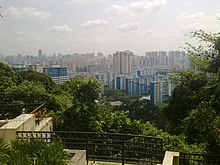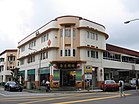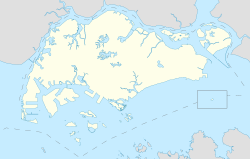Bukit Merah
Bukit Merah | |
|---|---|
| Other transcription(s) | |
| • English | Redhill |
| • Chinese | 红山 Hóngshān (Pinyin) Âng-soaⁿ (Hokkien POJ) |
| • Malay | Bukit Merah بوكيت ميره |
| • Tamil | புக்கிட் மேரா |
From top left to right: HarbourFront, Singapore Improvement Trust flats in Tiong Bahru, Skyline of Redhill, Henderson Waves, Jetty at Labrador Nature Reserve | |
 Location in Central Region | |
| Coordinates: 1°16′54.86″N 103°49′26.11″E / 1.2819056°N 103.8239194°E | |
| Country | |
| Region | Central Region
|
| CDCs | |
| Town councils |
|
| Constituencies | |
| Government | |
| • Mayors | Central Singapore CDC
South West CDC |
| • Members of Parliament | Jalan Besar GRC
Radin Mas SMC Tanjong Pagar GRC West Coast GRC |
| Area | |
• Total | 14.34 km2 (5.54 sq mi) |
| • Residential | 3.12 km2 (1.20 sq mi) |
| Population | |
• Total | 151,250 |
| • Density | 11,000/km2 (27,000/sq mi) |
| Ethnic groups | |
| • Chinese | 120,830 |
| • Malays | 11,430 |
| • Indians | 13,980 |
| • Others | 5,010 |
| Postal districts | 2, 3, 4, 5, 9, 10 |
| Dwelling units | 51,885 |
| Projected ultimate | 68,000 |
Bukit Merah, also known as Redhill, is a planning area and new town situated in the southernmost part of the Central Region of Singapore. The planning area borders Tanglin to the north, Queenstown to the west and the Downtown Core, Outram and Singapore River planning areas of the Central Area to the east. It also shares a maritime boundary with the Southern Islands planning area to the south. Bukit Merah is linked to Sentosa Island via Sentosa Gateway, Sentosa Broadwalk, Sentosa Express and the Cable Car.
Bukit Merah planning area also includes two offshore islands which are linked to the mainland by road, namely Pulau Brani and Keppel Island. It is the most populated planning area in the Central Region, and the 12th most populated planning area in the country overall, being home to more than 150,000 residents.[5]
Etymology
Bukit Merah translates to “red hill” in Malay, and is a reference to the red-coloured lateritic soil found on the hill. According to the Sejarah Melayu, Singapore used to be plagued by swordfish attacking the people living in the coastal regions. A young boy named Hang Nadim proposed an ingenious solution, to build a wall of banana stems along the coast at the present location of Tanjong Pagar.
When the swordfish attacked, their snouts were stuck in the stems. With the swordfish problem solved, Hang Nadim earned great respect from the people, but also jealousy from the rulers. The fourth King of Singapura, Paduka Seri Maharaja, finally ordered his execution, and it was said that his blood-soaked the soil of the hill where he was killed, giving rise to the red-coloured hill.[6]
The hill was eventually trimmed to its current state in 1973, when it made way for Redhill Close and what would eventually become the now defunct Henderson Secondary School. During its existence, a Chinese cemetery was situated on the reverse side of this hill, which is today, the location of Tiong Bahru.
History
Keppel Harbour dates back to the 14th century when an ancient Chinese traveller, Wang Dayuan named the harbour"Long-Ya-Men" or "Dragon Teeth Gate" after two rock outcrops located near Labrador Park, which resembled dragon's teeth. The two rock outcrops were subsequently blown up by the Straits Settlements Surveyor, John Thomson, in August 1848 to widen the entrance a new harbour.
With the earliest records of Bukit Merah's existence in the Malay Annals, the town had a huge role to play in the early maritime trade of the Kingdom of Singapura.
Mount Faber was once known as Telok Blangah Hill. Its name was changed to Mount Faber after Captain Edward Faber cut the road up to the top in 1845 to set up a signal station. The Singapore General Hospital site dates back to 1882. Labrador Nature Park was used as a defence outpost in the 19th century until World War II.[7]
The town's fertile red soil was employed to great effect when it was a district rich in gambier cultivation during British colonial rule.[8]
Even before the industrialisation of Jurong, Bukit Merah already had a small head start in the emerging heavy industry market in Singapore. With the first brickwork factories and mills emerging in the precincts of Henderson Hill and Redhill as early as the 1930s.[9]
The town is also home to the first housing estate in the country, Tiong Bahru, which was developed by the Singapore Improvement Trust in the backdrop of a rapidly growing population in post-war Singapore. The estate later became the basis of what would eventually become the first new town in the Republic, Queenstown.
Geography

According to the various master plans laid out by the Urban Redevelopment Authority, Bukit Merah is bounded by Alexandra Canal and the Singapore River to the north and HarbourFront and Keppel Bay to the south, Kim Seng Road, Outram Road and Cantonment Road to the east and Alexandra Road to the west. There are several subzones within the planning area, namely Alexandra, Bukit Ho Swee, Bukit Merah, City Terminals, Depot Road, Everton Park, HarbourFront, Henderson Hill, Redhill, Singapore General Hospital, Telok Blangah and Tiong Bahru.
Subzones
| Name of subzones | Location | Notable structures | Accessibility |
|---|---|---|---|
| Alexandra | Areas along Alexandra Road, Jalan Bukit Merah, Jalan Rumah Tinggi and Hoy Fatt Road | Alexandra Primary School, Alexandra Central, Alexandra Village, AIA Building and IKEA Alexandra | Labrador Park MRT station, Redhill MRT station and buses |
| Bukit Ho Swee | Areas along Jalan Bukit Ho Swee and Delta | Beo Crescent Market, Havelock Food Centre, Kim Seng Community Centre and Singapore Examinations and Assessment Board | Tiong Bahru MRT station, Havelock MRT station and buses |
| Bukit Merah | Areas along Bukit Merah Central | Bukit Merah Town Centre, Bukit Merah Bus Interchange, Bukit Merah Polyclinic, Former HDB Centre, Bukit Merah Secondary School and Gan Eng Seng Primary School | Buses |
| City Terminals | Pulau Brani and
areas near Keppel Harbour |
Port of Singapore Keppel Terminal, Police Coast Guard Headquarters and St. James Power Station | Keppel MRT station (future) and buses. Keppel Terminal is a restricted area |
| Depot Road | Areas along Depot Road | Central Manpower Base, Defence Science and Technology Agency, Depot Heights Shopping Centre, ISS International School and The Interlace | Buses |
| Everton Park | Areas bounded by Cantonment Road, Neil Road, Keppel Road | Cantonment Primary School, Former Tanjong Pagar railway station, Kampong Bahru Bus Terminal and Police Cantonment Complex | Cantonment MRT station (future), buses |
| HarbourFront | Bukit Merah South | HarbourFront Bus Interchange, HarbourFront Centre, Singapore Cruise Centre, VivoCity | HarbourFront MRT station, buses, cable car, Sentosa Express |
| Henderson Hill | Bukit Merah West | Bukit Merah West NPC, Delta Sports Complex, Gan Eng Seng School, Henderson Community Club and Tiong Bahru Park | Buses |
| Redhill | Northwestern Bukit Merah | Redhill Market and Food Centre, Leng Kee Community Centre and Enabling Village | Redhill MRT station, buses |
| Singapore General Hospital | Bukit Merah East | Duke-NUS Graduate Medical School, Health Promotion Board, Health Sciences Authority, Outram Community Hospital & SingHealth Tower, Outram Polyclinic and Singapore General Hospital | Outram Park MRT station, buses |
| Telok Blangah | Bukit Merah South | Blangah Rise Primary School, CHIJ St. Theresa's Convent, Mount Faber Park, Radin Mas Community Club, Radin Mas Primary School, Tang Gah Beo Temple, SAFRA Mount Faber, Telok Blangah Community Club and Telok Blangah Hill Park | Telok Blangah MRT station, buses |
| Tiong Bahru | Area bounded by Jalan Bukit Ho Swee, Outram Road, CTE, AYE and Lower Delta Road | Tiong Bahru Community Centre, Tiong Bahru Market, Tiong Bahru Plaza and Zhangde Primary School | Tiong Bahru MRT station, buses |
Transportation
Mass Rapid Transit
Outram Park MRT station was the first station to open in the planning area in 1987, followed by the namesake Redhill MRT station and Tiong Bahru MRT station in 1988. Today, there are currently 7 MRT stations that serve the planning area across 4 lines, the East West line, Circle line, North East line and the Thomson-East Coast line. HarbourFront MRT station is an interchange station between the North East line and the Circle line, which is also the current terminus for both lines. Outram Park MRT station was initially a double-line interchange station between the East West and North East lines but became a triple-line interchange station after the commencement of the third stage of the Thomson–East Coast line in 2022. The 7 stations are:
- TE16 Havelock
- EW16 NE3 TE17 Outram Park
- EW17 Tiong Bahru
- EW18 Redhill
- CC27 Labrador Park
- CC28 Telok Blangah
- NE1 CC29 HarbourFront
Future stations that are currently under construction include:
- CC30 Keppel
- CC31 Cantonment
The future stations, Keppel and Cantonment will be located within the new town as part of Stage 6 of the Circle line that will be completed by 2026.[10]
Bus
There are two bus interchanges and one bus terminal in the new town. The Bukit Merah Bus Interchange, which serves Bukit Merah, is located at Bukit Merah Town Centre. Service Number 132 links the Interchange to Redhill MRT station while bus services 5, 16, and 851 link the interchange to Tiong Bahru MRT station. There are two feeder services originating from the interchange which serves the Telok Blangah estate. The HarbourFront Bus Interchange is located at the southern part of Bukit Merah, serving nearby amenities such as the HarbourFront Centre and VivoCity, the largest shopping mall in Singapore. The Kampong Bahru Bus Terminal is located along Spooner Road, near the vicinity of the Singapore General Hospital.
Education

Primary schools
- Alexandra Primary School
- Blangah Rise Primary School
- Cantonment Primary School
- CHIJ Kellock
- Gan Eng Seng Primary School
- Radin Mas Primary School
- Zhangde Primary School
Secondary schools
Tertiary institutions
Other schools
- Academy of Singapore Teachers (AST)
- APSN Tanglin School
- ISS International School (Preston Campus)
- North London Collegiate School (Singapore)
- Shelton College International
Amenities


Places of worship
Buddhist temples
- Wat Ananda Metyarama Thai Buddhist Temple
- Kwan Yam Theng Buddhist Temple
- Buddhist Fellowship West Centre, in Yeo's building
Chinese temples
- Ban Siew San Kuan Imm Temple (1880)
- Giok Hong Tian Temple (1887)
- Hock Teck Tong Temple (1932)
- Kai San Temple (1904)
- Kim Lan Beo Temple (1830, relocate in 1984)
- Leng San Teng Temple (1879)
- Koon Seng Ting Temple (1880)
- Lei Yin Temple (1957)
- Qi Tian Gong Temple (1920)
- Qi Tian Tan Temple (1949)
- Tai Yeong Kon Temple (1947)
- Tang Gah Beo Temple
- Telok Blangah Ting Kong Beo Temple (1923)
Chinese clan temples
- Lim See Tai Chong Soo Kiu Leong Tong Temple
- San Jiang Gong Ci Temple
Chinese combined temples
- Chia Leng Kong Heng Kang Tian Temple
- Chin Leng Keng (Leng San Teng, Chin Lin Keng & Ban Sian Beo)
- Temple of Liang Hong Sze Kong Hock Keng Heap Hoe Keng
Churches
- Grace Assembly of God 1
- Church of God Singapore
- Church of St. Teresa
- Danish Seamen's Church
- Grace Methodist Church
- Pasir Panjang Tamil Methodist Church
- St. Matthew's Church
- Telok Ayer Chinese Methodist Church
Hindu temples
Mosques
- Masjid Al-Amin Mosque
- Masjid Jamiyah Ar-Rabitah Mosque
- Masjid Kampong Delta Mosque
- Masjid Temenggong Daeng Ibrahim
Sikh temples
- Gurdwara Sahib Silat Road
Shopping centres
- Alexandra Central
- Alexandra Retail Centre
- Concorde Shopping Centre
- Depot Heights Shopping Centre
- HarbourFront Centre
- Tiong Bahru Plaza
- VivoCity
Parks

- Alexandra Canal Linear Park
- Alexandra Hill East Neighbourhood Park
- Bukit Purmei Hillock Park
- Henderson Park
- Labrador Nature Reserve
- Mount Faber Park
- Rumah Tinggi Eco Park
- Telok Blangah Hill Park
- Tiong Bahru Park
Community centres/clubs
- Bukit Merah Community Centre
- Henderson Community Club
- Kim Seng Community Centre
- Leng Kee Community Centre
- Radin Mas Community Club
- Telok Blangah Community Club
- Tiong Bahru Community Centre
Sports facilities
- Delta Sports Complex
- SAFRA Mount Faber
- Sports Lifestyle Centre
Politics
Bukit Merah belongs to six political divisions in four constituencies. A large portion of Bukit Merah is under Tanjong Pagar GRC with some areas under Jalan Besar GRC, Radin Mas SMC and West Coast GRC, served by the People's Action Party. As of the 2020 General election, the Members of Parliament for Tanjong Pagar GRC are Indranee Rajah for Tanjong Pagar-Tiong Bahru division, Joan Pereira for Henderson-Dawson division and Eric Chua for Queenstown division. Melvin Yong is the current Member of Parliament for Radin Mas SMC, Rachel Ong for Telok Blangah division of West Coast GRC and Josephine Teo for Kreta Ayer-Kim Seng division of Jalan Besar GRC. The planning area is overseen by three town councils, namely Tanjong Pagar Town Council (TPTC), West Coast Town Council (WCTC) and Jalan Besar Town Council (JBTC).
Bukit Merah is covered by two Community Development Councils (CDC), Central Singapore District and South West District. Denise Phua is the current mayor for Central CDC and Low Yen Ling is the current mayor for South West CDC.
See also
References
- ^ a b City Population – statistics, maps and charts | Bukit Merah
- ^ a b HDB Key Statistics FY 2014/2015 Archived 4 March 2016 at the Wayback Machine
- ^ "Statistics Singapore - Geographic Distribution - 2018 Latest Data". Retrieved 11 February 2019.
- ^ "Singapore Residents by Planning Area/Subzone, 2015". Singapore Department of Statistics. Archived from the original (XLS) on 10 June 2016. Retrieved 24 May 2016.
- ^ "Statistics Singapore – Geographic Distribution". singstat.gov.sg. Archived from the original on 16 November 2016. Retrieved 6 June 2017.
- ^ "Bukit Merah Town Centre". lostnfiledsg. 9 August 2012. Retrieved 9 November 2015.
- ^ "Singapore Bukit Merah Map & Bukit Merah Singapore". streetdirectory.com. Retrieved 9 November 2015.
- ^ "Singapore Infopedia – Bukit Merah". National Library Board.
- ^ "ALEXANDRA BRICKWORKS". The Straits Times. 17 February 1931.
- ^ "Three new stations to close loop on Circle Line". TODAYonline. Retrieved 13 March 2016.
Sources
- Victor R Savage, Brenda S A Yeoh (2003), Toponymics – A Study of Singapore Street Names, Eastern Universities Press, ISBN 981-210-205-1
- https://lostnfiledsg.wordpress.com/2012/08/09/bukit-merah-town-centre/
- http://eresources.nlb.gov.sg/infopedia/articles/SIP_779_2005-01-26.html






